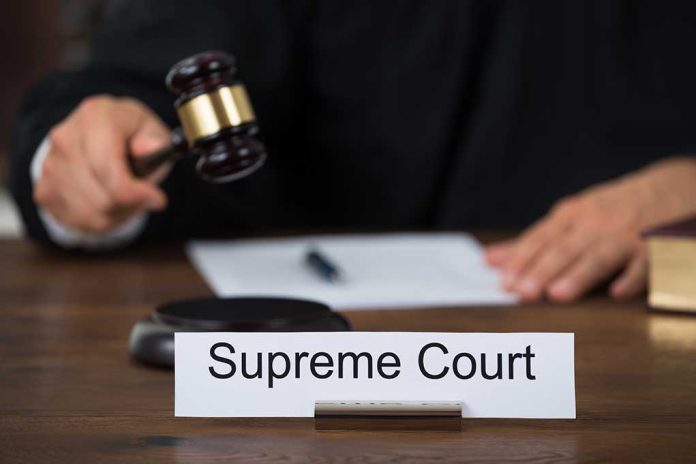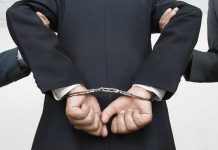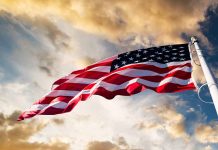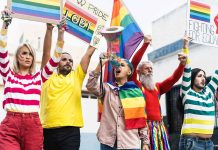
The Supreme Court’s rejection of a January 6 rioters appeal sets a precedent for hundreds of similar cases, raising concerns about free speech and protest rights in the U.S. Capitol.
At a Glance
- Supreme Court declined to hear John Nassif’s appeal challenging the constitutionality of Capitol demonstration ban
- Lower courts ruled the Capitol is not a traditional public forum for protests
- Decision affects over 460 similar cases from January 6 defendants
- Ruling reaffirms broader restrictions to ensure government operations and security
- Over 1,500 individuals face charges related to Capitol breach
Supreme Court Declines to Hear January 6 Appeal
The U.S. Supreme Court has declined to hear an appeal from John Nassif, a Florida man convicted for his role in the January 6, 2021 Capitol attack. Nassif challenged the constitutionality of a law prohibiting “parading, picketing, and demonstrating” inside the Capitol, claiming it violates First Amendment rights. This decision leaves intact lower court rulings that have consistently rejected such arguments, potentially impacting hundreds of similar cases.
UPDATE ON SCOTUS CERTIORARI:
I heard from my appeals attorney that my case has been distributed for the November 8 conference, which means the Court will start reviewing it to decide if they want to grant certiorari.
If successful the unconstitutional law so many #J6 ers plead…
— John Nassif (@BigJohnNassif) November 1, 2024
Nassif, who was sentenced to seven months in prison for misdemeanors including disorderly conduct and violent entry, argued that the Capitol should be considered a public forum for protests. However, lower courts, including the U.S. Court of Appeals for the D.C. Circuit, disagreed with this interpretation.
Capitol Not a Traditional Public Forum
The D.C. Circuit classified the Capitol as a nonpublic forum, allowing for broader restrictions on demonstrations. This classification is crucial in understanding the legal basis for limiting protests within the building. U.S. District Judge John Bates, in upholding the parading charge, emphasized the need for such restrictions to maintain order and security in the Capitol.
“Nassif has not established that the Capitol buildings are, by policy or practice, generally open for use by members of the public to voice whatever concerns they may have — much less to use for protests, pickets, or demonstrations.” – three-judge panel
This ruling reaffirms the government’s authority to restrict certain forms of speech and assembly within the Capitol to ensure the smooth functioning of government operations and maintain security. The decision is likely to have far-reaching implications for over 460 defendants charged with the same misdemeanor related to the January 6 riot.
Broader Impact on January 6 Cases
The Supreme Court’s decision comes amid ongoing legal proceedings related to the Capitol breach. Nearly 600 defendants have been charged with assaulting law enforcement, with arrests continuing. The most severe sentences have been given to group leaders like Stewart Rhodes and Enrique Tarrio for seditious conspiracy and orchestrating the riot.
While this ruling clarifies the legal status of protests within the Capitol, it also raises questions about the balance between security measures and the right to demonstrate in our nation’s capital. The decision may influence future First Amendment challenges and shape the understanding of permissible protest locations in government buildings.
Political Implications and Future Considerations
The January 6 cases continue to have political ramifications. Former President Donald Trump has promised to pardon some individuals convicted of January 6-related crimes if re-elected. This pledge has sparked debate about the long-term consequences of the Capitol breach and the role of executive clemency in such cases.
“I am inclined to pardon many of them. I can’t say for every single one because a couple of them, probably they got out of control.” – Donald Trump
Meanwhile, Trump himself faces charges related to the January 6 events and efforts to overturn the 2020 election, to which he has pleaded not guilty. A recent Supreme Court ruling on presidential immunity has led to the postponement of pretrial dates in Trump’s case, highlighting the complex legal landscape surrounding these issues.
As the legal proceedings continue, the Supreme Court’s decision in Nassif’s case serves as a significant marker in the ongoing debate about free speech, public safety, and the limits of protest in America’s most symbolic government buildings.
Sources:
- Supreme Court rejects appeal over Jan. 6 ‘parading’ charge
- Supreme Court rejects appeal over Jan. 6 ‘parading’ charge
- US Supreme Court Rejects Jan. 6 Defendant’s Appeal Over Parading Charge














